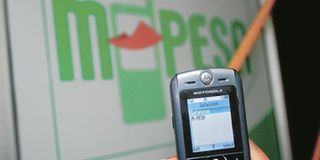Generating M-Pesa statements with new app

While many people use M-Pesa for transacting their business, until now, users have to save receipts and haul them out at the end of the month to an accountant to sort them out. Photo|FILE|
What you need to know:
- How does it work? Interested users download the software on Google Market Play store under the name of Zebumob onto their Android phones.
- The app uploads each M-Pesa transaction to the protected website www.zebumob.com.
- Users access their information by logging on at www.zebumob.com using their password and either print out their statement or export it to an Excel spreadsheet for further formatting and analysis.
Currently, the most developed mobile payment system in the developing world, M-Pesa, allows users to deposit, withdraw, and transfer money easily with a mobile device.
That’s not all, one can redeem deposits for regular money, pay bills, purchase airtime and transfer money between the service and a bank account.
This service has spread quickly and has become the most successful mobile phone-based financial service in the developing world.
Five years after the service was launched, over 15 million users in Kenya have M-Pesa accounts. This is constitutes about 70 per cent of the adult population.
At the national level, it is estimated that around 25 per cent of Kenya’s GNP flows through it. At the international level, more than half of all the world’s mobile-money transactions are by Safaricom.
While many people use M-Pesa for transacting their business, until now, users have to save receipts and haul them out at the end of the month to an accountant to sort them out.
But if most of the transactions are through M-Pesa, then this end-of-month headache could be managed almost effortlessly thanks to a new application known as Zebumob.
This nifty software was developed for Android phones to help users categorise, monitor and manage their transactions.
How does it work? Interested users download the software on Google Market Play store under the name of Zebumob onto their Android phones.
The app uploads each M-Pesa transaction to the protected website www.zebumob.com.
Users access their information by logging on at www.zebumob.com using their password and either print out their statement or export it to an Excel spreadsheet for further formatting and analysis.
Only the user can view or delete their records of M-Pesa transactions. Records of M-Pesa transactions resemble bank-generated financial statements.
With these statements, one can track their sources of income and spending patterns of funds received via M-Pesa.
“Users can categorise their expenditure items and monitor them over a period of time,” says Muthuu Kagio, the company’s head.
For example, one can track how much one has spent on entertainment, fees, food or transport for a given period, say a month.
The collected information can help users create a budget based on past spending patterns.
The company makes money through advertisements and helping small businesses and institutions that use M-Pesa further classify and analyse their transactions.
The application has a customised spreadsheet analysis programme for small businesses that use M-Pesa for their daily transactions.
This is a value addition to the successful M-Pesa service. The company hopes that, M-Pesa users will see value in maintaining records of their transactions in an organised and easily accessible fashion.
In addition, M-Pesa is morphing from a person-to-person, money transfer to a person-to -corporation and small business transfer, As such, M-Pesa is becoming more like a credit card.
For now, the app only works on all Android devices with Android 1.6 and above. In Kenya, where just about every adult has a mobile phone but only a minority have a bank account, banking on the move seemed the obvious answer to all sorts of problems.
The ability to track M-Pesa-based income and expenditure may in future become a reference point when evaluating the credit worthiness of an individual or business.
Doing well
Kenya is rated among the countries doing very well on mobile phone penetration. There are 74 mobile phones for every 100 Kenyans, against an African average of 65. And nearly all Internet access is via mobile phones.
With this latest development, we can expect more apps, more innovation and a certain amount of hype about the mobile phone becoming the centre of your financial life.
Sam Wambugu is a monitoring and evaluation specialist.




